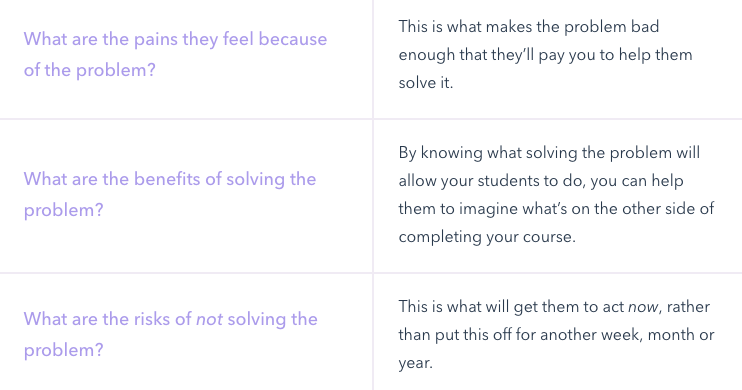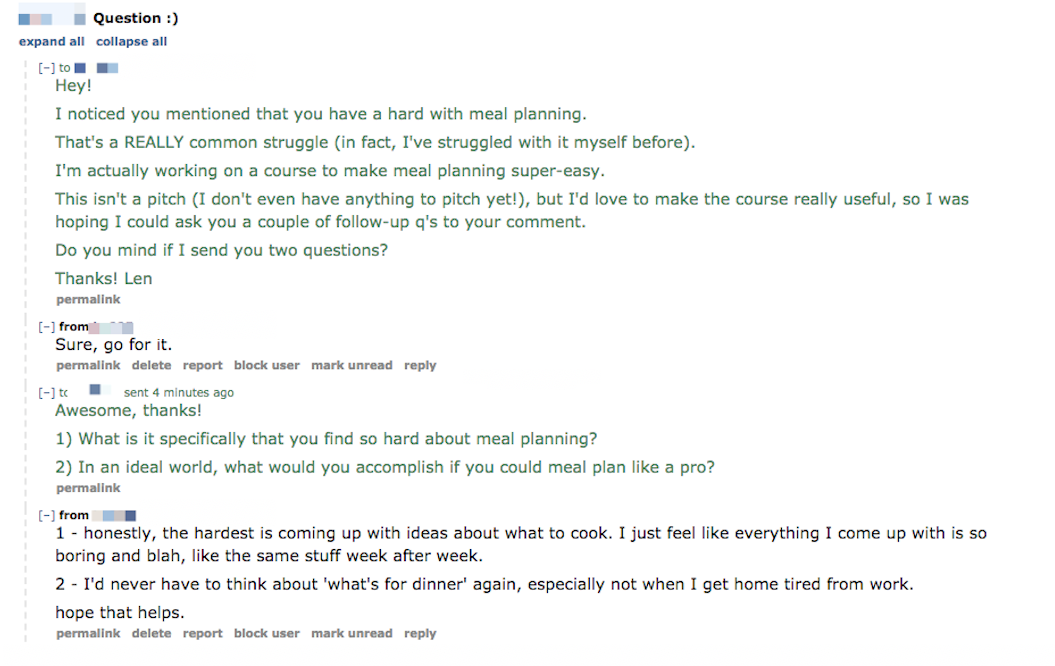
The beginner’s guide to using Reddit to find a profitable online course idea
I’ve studied thousands of courses, and I’ve seen popular, profitable courses built on the most unexpected topics you can imagine.
Know this: there IS a topic out there that you’re capable of building a profitable course about.
I spend my days as the CMO of Podia, an online teaching platform that hosts more than 9,000 courses. I hear from people all the time that finding and validating a course topic is the biggest hurdle for building an online business.
And with the right research strategy and a few key frameworks, you can uncover that topic.
Today, I’m going to show you exactly how to do that, using the sixth most-trafficked website in the world: Reddit.
This is the exact strategy that we used to validate and build the Content Marketing Mastery course that has done more than $200,000 in sales, and many of the problems addressed in both the course and the sales copy were uncovered on Reddit. It’s a process you can use yourself if you’re still figuring out the topic of your next course.

How to find your audience’s burning pains on Reddit
GrowthLab founder Ramit Sethi has written at length about the importance of identifying “burning pains” for course creators:
“When you solve a burning pain for your readers, your course will fly off the shelves. It’s like how if you wake up in the middle of the night with a throbbing toothache, what are you going to do? You’re going to go straight to the dentist and do whatever they say.”
When you create your product, the biggest thing to think about is: What’s the burning pain that people have?
Here’s the thing about burning pains: If it burns badly enough, then people are going to look to the internet for help — and many of those people turn to Reddit. Here’s a step-by-step guide for uncovering those future customers:
Step 1: Find all relevant subreddits
Begin by thinking of a general topic that you think your online course might fall under. It could be a topic you have an interest in, or an industry you’ve worked in.
You don’t have to be super specific yet. Think: productivity, golf, business, design, programming, or something similarly broad.
In this article, we’ll use “cooking” as an example and continue by making a list of all of the subreddits that people might go to in order to solve their cooking pains. I recommend doing this in a Google Sheet. You can use mine as a template.
Click here for the spreadsheet I use. Just make a copy to use it for your own idea research.
You can find subreddits a few ways: First, Google “Reddit + [your topic].”

Add any subreddits that come up in the first few pages of search results to your list. I also recommend adding a column to your spreadsheet for subreddit “size.” You can find this in the right sidebar of each subreddit.

Later, having this information will help us focus our search, especially if you end up with a lot of subreddits.
Another search query to try is “best [your topic] subreddits.” This will give you both Reddit-based results, as well as curated lists from other sites.

Next, we’ll turn to Reddit itself.
Use the search box in the right sidebar to type in your topic, and click “next” to see a list of relevant subreddits.

To go even deeper, visit the subreddits you’ve found, and check the right sidebar. Many subreddits will list other relevant subreddits here.

Add these to your list.
Step 2: Go digging
In this step, we’re going to go inside of these communities and try to root out some burning pains.
If you have more than ten on your list, sort your spreadsheet by subreddit size, and start with the largest subreddits first for this step. You can keep going down the list until you have a course idea you’re confident in.

Some subreddits will be extremely active (such as r/cooking). Others will only have a few posts here and there. Don’t worry too much about that for now.
The important part, no matter how active the subreddit, is finding the valuable information within the communities. General conversations about cooking aren’t valuable. But people discussing specific problems they have with cooking? Those conversations are extremely valuable.
To find the gold, you can search each subreddit using terms that suggest someone is struggling with a problem.
Try the following search terms (include the quotes!):
- “How do you”
- “How can I”
- “I can’t stand”
- “I’m struggling with”
- “Can someone help”
- “Please help me”
- “Any tips”
- “Any tips for”
- “Suggestions”
What we’re looking for are posts that signal that someone is struggling with a problem, and that OTHER people are struggling with it, too. So as you browse through the results, pay special attention to the number of comments a thread has.

Jot these course ideas — along with links to the relevant threads — in the second tab in your spreadsheet.

Another approach to try is to search for existing lists of burning pains.
Search for terms like:
- “Biggest challenge”
- “Biggest challenges”
- “Hardest part”
- “Biggest struggle”
- “Struggle with”
This can lead to mega-threads where users do all of the hard work of uncovering challenges for you.

When you’ve compiled 15-20 topic ideas into the Ideas tab of your spreadsheet, move on to the next step.
Want to build a business that enables you to live YOUR Rich Life? Get my FREE guide on finding your first profitable idea.
Step 3: Filter mere annoyances from the burning pains
In this step, we’re going to try to identify which ideas are simply annoying to people, and which ones are burning pains that they’ll pay to solve. There’s a small but subtle difference there that can be the deciding factor between a flop and a course that resonates.
It’s going to require a bit of detective work. First, read through all of the comments in each thread, and try to get a feel for the sentiment that surrounds each problem.
Do people write about the problem with emotion and desperation? Or do they treat it as a “yeah, that sucks, but ¯\_(ツ)_/¯” problem?
We’re looking for THIS:

Hm. It looks like meal planning is a pain point.
Not this:

When you come across comments that indicate a burning pain, move that problem into the “Prioritized Ideas” tab in your spreadsheet, and save the comments.

Saving these comments will help you understand people’s experiences with your problem more clearly, and you’ll be able to write irresistible sales copy for your course later on. ***
Alright, you’re armed with some ideas that you’ve identified as real burning pains. Now we’re going to separate ourselves from the average course creators who are content with a surface-level understanding of their audience. This is where we go deep.
Step 4: Talk to your potential customers
In this last step of the research process, it’s time to stop browsing and start talking. Or, at least, messaging.
We’re going to reach out to some Redditors via Private Messages (PMs) to try and collect even more insight into their experience, goals, struggles, and fears. Go back to the threads where you’ve identified users discussing their burning pains, and reach out to try and learn more. (Take note of the time of the comment. Reaching out to someone who expressed a burning pain five years ago will likely result in crickets or confusion.)
To send a PM, click on a Redditor’s username and look at the right sidebar, where you’ll find the “Send A Private Message” button.

Three key questions we want to be able to answer are:

Of course, you don’t have to ask them these exact questions like a robotic market researcher weirdo.
In fact, you probably shouldn’t.
Instead, tailor your questions to their comments, and try and get them to open up and expand on what they’ve described.

Remember: when you hear something interesting, ask for more!
Ask the other person to expand on things, or ask them why they feel a certain way about something.
The deeper you go, the better you’ll understand people’s true challenges, and the more irresistible your online course will be to them.
Ask questions like:
- “That’s really interesting. Why do you think that is?”
- “What do you think keeps you from [taking action X]?”
- “Do you think you would you do [action X] if [condition Y were met]?”
- “Would you mind expanding on [point Z] a bit more? I’m especially interested in ____.”

Not everyone will respond to you, so you’ll have to cast your net as wide as you can. Don’t be surprised if you need to send 10 PMs to get a single response, but don’t be discouraged, either.
You’re not going for quantity here; just a few powerful insights here will make all of this worth the effort.
Don’t forget to save these answers in your spreadsheet, too.
Step 5: Pick the best idea for your online course
You now have a list of potential online course topics that you could tackle. Now we’re going to hone in on the best ones. We’ll judge these final few ideas on two elements:
- Passion: How excited are you to work on this challenge? If you hate working on something, you’re likely to quit before you can earn a dime.
- Profit potential: Is it a problem that people would pay to have solved for them? A good question to think about is “do people already spend money to solve this problem, in the form of books, apps, services, etc.?”
Plot the ideas from your list on the Passion/Profit Matrix below.

Here’s how this might look filled out with some of the ideas we collected during our cooking research:
We’re looking for ideas that fall into the top right quadrant: the ones that you’re excited to work on and that you’ll be able to get people to pay to solve.
In this example, “How to make eggs” is probably not a great idea because while I’d enjoy working on it, not that many people seem to struggle with it. I’m also skipping “How to cook healthy to-go lunches for young children” because although it’s a common struggle, it’s not really something I’d enjoy creating a course about.
But “How to grocery shop better,” “How to use knives like an expert,” and “How to impress your date/loved one with cooking”?
These are excellent online course ideas.
There are plenty of profitable ideas, if you know where to look
Creating and selling a successful online course starts with identifying deep burning pains that people will pay to have eliminated. And as the world’s largest community of people publicly looking for solutions to their burning pains, Reddit is perhaps the biggest gold mine for profitable course ideas on the planet.
Now that you’ve mined Reddit and come up with an idea, the next step is to validate its potential as a profitable online course.
I love GrowthLab’s simple technique for testing your business idea, which I’ve adapted to this process:
- Find a few people who might be interested in your course. You can go back to any Redditors you messaged who might be a good fit, or ask anyone else you think might be interested. Friends, family members, acquaintances … it doesn’t matter. If you think your course might solve a problem for them, they’re worth approaching.
- Gauge their interest. Say “I’m thinking of starting an online course around [YOUR COURSE IDEA]. If it solves [PROBLEM] for you, would you be interested in buying it? I don’t know the price yet, but I’d be happy to send you an email when it launches.”
- Keep going until you get 10 “yes” answers. You now officially have a pre-launch email list! Ten yeses is your green light to get started working on your course. These will be the first 10 people you pitch to when your course is ready.



